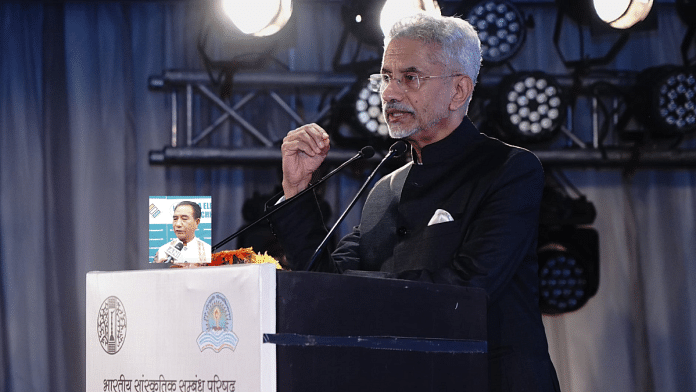New Delhi: External Affairs Minister S. Jaishankar expounded on the “Bharat narrative”, economically, developmentally, politically and culturally, while speaking Monday at the Knowledge India Visitor’s Programme organised by the Indian Council for Cultural Relations (ICCR).
“What does it mean, building a Bharat narrative? People sometimes see it as politics, sometimes they look at the wordplay and think that this is some kind of linguistic message. But if you look at really the term Bharat…it today actually has multiple symbolisms in different domains,” he said.
The minister’s remarks at the 4-6 December event come amid a political row over what the country should be referred to as — ‘India’ or ‘Bharat’ — sparked in September when President Droupadi Murmu sent dinner invitations to the G20 heads of states, ministers, and government officials as the ‘President of Bharat’.
Article 1 of the Constitution of India in its first line declares, “India, that is Bharat, shall be a Union of States”. President Murmu’s invitations, accessed by ThePrint at that time, did not mention ‘India’ at all. Prime Minister Narendra Modi also used the nameplate ‘Bharat’ during the opening of the September G20 summit held in New Delhi.
Critics, however, saw it as an attempt to change India’s fundamental character.
Speaking on the “narrative” of Bharat, Jaishankar delved into four dimensions. “Economics wise, we would speak about the “Atmanirbhar Bharat”. It has a connotation of a certain resilience, a certain self-sufficiency, a contribution, a talent out there, which is expressing itself,” he said.
“Developmentally today, when we speak about Bharat, it also implies a commitment to creating an inclusive, just, and fair society where no one is left behind and that is actually in many ways the true test of development,” he added.
‘Bharat as a global friend’
Jaishankar called the idea of Bharat a “statement of independence” and a “declaration” of India’s engagement with the world being on its own terms and defined by its own “personality”.
“Bharat is a statement of independence. It is a declaration that as India engages the world, it doesn’t have to be done necessarily in terms set by others or in frameworks determined by others,” the minister went on to say.
The objective of the engagement, he claimed, is “to actually let our own personality and let our own innate qualities come out”.
“It is, in ways I would say, an expression of the persona of a society,” he told the audience.
Culturally, Bharat is a part of “our languages, our traditions, our heritage, our practices”, Jaishankar explained, adding that the idea is to create a Bharat that would “like to be perceived as a vishwamitra (a friend of the world)”.
“As a friend, which, at crucial moments, has really stepped up. Stepped up in a way in which countries and societies normally do not do in international relations. A society where people are still being vaccinated but is willing to share those vaccines with the rest of the world. A society where when we have a chance to assume a responsibility like we did at the G20, that we did so with a cause and commitment to the global south,” the minister said.
India, he said, had successfully become a “bridge” to the East and the West by bringing together the leaders of the G20 for the New Delhi Leaders’ Declaration. This was despite fears that New Delhi would not be able to do so in days preceding the leaders’ summit, he added.
While G20, Jaishankar said, is the most “important” economic and political global grouping, there’s also a need for cultural “rebalancing” to necessitate fairer global relationships between every country in the world.
“When we speak about democracy, we may have democracy within a society but there has to be a democracy among societies as well,” he further said, adding: “If there are 200 countries in the world, there are at the very least 200 cultures in the world. How do we give value and respect to all of them? I think that in many ways is the big question facing the world today.”
(Edited by Uttara Ramaswamy)
Also Read: ‘India’ is geographical & ‘Hindustan’ is political. Only ‘Bharat’ captures our heritage



